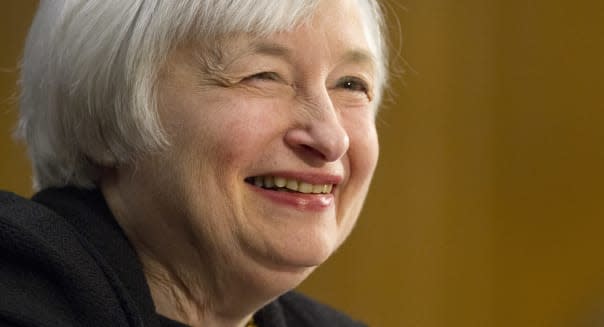Yellen Clears First Senate Hurdle to Become Next Fed Chair

By Alister Bull
and Margaret Chadbourn
WASHINGTON -- Federal Reserve Vice Chair Janet Yellen moved closer Thursday to becoming the first woman to lead the U.S. central bank after a Senate committee approved her nomination and sent it to the full Senate for a final vote.
If confirmed, as is widely expected, Yellen would replace Fed Chairman Ben Bernanke when his term expires on Jan. 31 and become the most powerful woman in world finance.
The vote was 14-8. Three Republicans backed her appointment and one Democrat voted no.
A Democratic leadership aide said the aim was to hold a confirmation vote in the full Senate in December.
Nominated by President Barack Obama, Yellen is viewed as a monetary policy dove more concerned about the costs to society of high unemployment than about the risk aggressive actions to lower it will ignite future inflation or fuel asset bubbles.
She will preside over a central bank that has taken dramatic and unconventional steps to spur economic growth, and which is now wrestling with a decision on when to scale back a bond-buying program that has sought to drive down long-term market interest rates.
The Fed has held benchmark U.S. interest rates near zero since late 2008 and has quadrupled the size of its balance sheet to $3.9 trillion through three massive asset purchase campaigns. It is currently buying $85 billion in bonds a month.
Both Yellen and Bernanke have emphasized in recent days that the Fed will keep interest rates low for some time even after it winds down its asset purchases, remarks that have bolstered expectations of policy continuity at the central bank.
Friends and Foes
Minutes of the Fed's October meeting released Wednesday showed policymakers were debating how best to enhance their forward guidance on when to expect rates to rise to help temper any economically disruptive moves in financial markets once the central bank starts tapering its bond buying.
The Fed has said it wouldn't raise rates before the U.S. jobless rate falls to 6.5 percent, as long as inflation looked set to stay below 2.5 percent. Unemployment stood at 7.3 percent in October.
When Bernanke first broached the possibility of a near-term reduction in the asset purchases in May and June, he sparked a bout of global financial market turmoil that sent bond yields soaring and hit emerging markets hard.
The Fed's aggressive actions have drawn fire from Republican lawmakers worried about the risk of inflation and asset bubbles. %VIRTUAL-article-sponsoredlinks%Many also complain the central bank has abetted big spending by the Obama administration by snapping up the bulk of new Treasury debt issuance.
"The long-term costs of these policies are unclear and frankly worrisome," Sen. Michael Crapo, the top Republican on the banking panel, said before voting "no."
Despite those concerns, Yellen is expected to handily win confirmation when the full Senate considers her nomination.
Democrats control 55 of the 100 votes in the Senate, which means she would need the backing of only a handful of Republicans to secure the 60 votes necessary to clear any procedural hurdles that might be thrown in her path.
She looks well on the way to reaching that threshold.
Yellen received support from three Republicans on the committee: Bob Corker of Tennessee, Tom Coburn of Oklahoma and Mark Kirk of Illinois.
In addition, Republican Sens. Susan Collins of Maine and Lindsey Graham of South Carolina have also indicated they are inclined to back her.
The Democrat who voted against her in committee was Joe Manchin of West Virginia.
